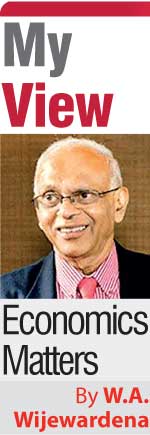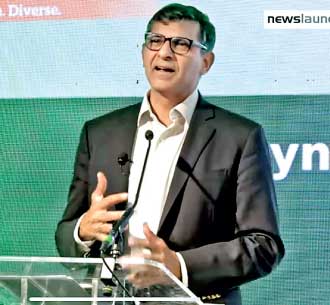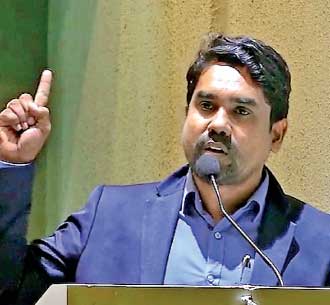Saturday Feb 21, 2026
Saturday Feb 21, 2026
Monday, 17 July 2023 01:26 - - {{hitsCtrl.values.hits}}
|
 Growth lab approach to lay foundation for Target 2048
Growth lab approach to lay foundation for Target 2048
President Ranil Wickremesinghe has announced that his target has been to make Sri Lanka a rich country by 2048. This goal has been specifically chosen from a sentimental point. That is, the year 2048 touches the hearts of Sri Lankans because it is the centenary of old Ceylon’s gaining independence from Britain. Consequently, Ceylon which was a prosperous country with an enormous promise in 1948 can at least after a century join the rich country club, and hence it is really a worthwhile goal to pursue.
Prior to this, India’s Prime Minister Narendra Modi too had announced that it was the goal of his government to plan for becoming a rich country by 2047 when it will celebrate its centenary of independence from Britain. To set the ball rolling toward this goal, President Wickremesinghe has announced, in an address to the nation, that he will pursue the ‘growth lab approach’, a system of growth planning developed by Ricardo Hausmann and others for the Growth Lab of the Harvard Kennedy School, to determine the strategies that should be adopted by the country for attaining this goal.
Harvard’s diagnostic study in 2018 on Sri Lanka
Wickremesinghe has a soft corner for Harvard Kennedy School because he happened to be an alumnus of this prestigious educational body. His fascination for Harvard is so high that he invited its Centre for International Development or CID to host Sri Lanka Growth Summit along with George Soros in January 2016. The objective was to bring all the stakeholders together into a single hall and discuss how Sri Lanka should map out its growth strategy for the next decade.
Following this, there was a team of young Sri Lankan policymakers who underwent training in policymaking at CID. Though this team did not make any policy for the country, the Harvard Kennedy School had conducted a growth diagnostic study for Sri Lanka in 2018 on Wickremesinghe’s invitation as the Prime Minister (available at: https://growthlab.cid.harvard.edu/publications/sri-lanka-growth-diagnostic). Growth Lab says that this report was submitted to Wickremesinghe in 2018. It seems that no action was taken by the then Yahapalana Government on this report. Hence, it is natural for him to go back to this approach as the head of the nation so that he could reactivate the actions missed at that time to bring richness to Sri Lanka today.
 |
| Dr. Raghuram Rajan |
 |
| Jayantha Kovilagodage
|
Global value chains or production sharing networks?
The diagnostic study found that Sri Lanka’s economic growth has been constrained by the poor performance of the exports sector that covers both the merchandise goods and the sale of services. They have been constrained by the country’s failure to link itself to global value chains which Sri Lanka born economist of ANU fame, Prema-Chandra Athukorala, has termed Global Production Sharing Networks (see: https://www.ft.lk/columns/prema-chandra-athukorala-chinthana-joining-production-sharing-chain-is-the-way-out-for-sri-lanka/4-555377). The point of departure by Athukorala from global value chains advocated by Harvard Growth Lab is that value chains are simply one way traffic from value creating country to value receiving country. Hence, the value creating country should have capacity to create value and sell to the other. But Athukorala argues it should be a two-way traffic in which the value receiving country also provides continuous technical assistance to upgrade the quality of the value creating country. That is why it is called production sharing networks. A good example is the Sri Lanka’s Harness Lanka that produces critical sensors for activating airbags in motor vehicles.
Exports, the saviour of Sri Lanka
According to the diagnostic study conducted by Harvard’s Growth Lab, export of goods and services has not been diversified by Sri Lanka by product or by destination. It is not unusual for the country to record this poor performance because it is handicapped by ineffective land use governance, underdeveloped industrial and transportation infrastructure, and policy uncertainty especially in relation to tax and trade policies. These are the most binding constraints for Sri Lanka’s growth initiatives. Simultaneously, there were some eight non-binding constraints covering finance, education, health, geography, electricity, labour regulations, macro-fiscal stability, and corruption. These binding and non-binding constraints should be eliminated if the country were to make a breakthrough in its growth initiatives.
Anti-corruption is more important
Though the diagnostic study has termed it as non-binding, corruption, and the associated factors behind corruption, namely, governance, democratic rule versus authoritarianism, and the rule of law are very much pertinent to Sri Lanka’s ambition to become a rich country by 2048. Two other aspects that are connected to this desired governance system are the freedom of thought and freedom of expression.
|
Two views on democracy and freedom of expression
In this connection, there have been two recent expressions of view on the subject one from neighbouring India and the other from Sri Lanka. The first is by Raghuram Rajan, who was one time Governor of the Reserve Bank of India and presently a Don at the University of Chicago when addressing the Ideas for India in London (available at: https://youtu.be/PUDaHgHC8ao). The other is by Sri Lankan social media activist and economic analyst of Sri Lanka Business TV fame, Jayantha Kovilagodage, who, addressing a symposium hosted by Bar Association in Colombo, debunked the popular views by many that social media should be excessively controlled (available at: https://fb.watch/lJiuShyn9J/?mibextid=2Rb1fB).
Raghuram Rajan: Democracy needed to build trust and confidence
Rajan says that there is a growing demand in India that Prime Minister Narendra Modi should function like an authoritarian leader to push India toward the goal of becoming a rich country by 2047. Given the type of influencing political gimmicks being played by leaders of developing countries on their citizens, these demands may have been orchestrated by the leadership itself. But Rajan says for India to reach the goal of being a rich country, it should join the emerging trend of supply chains. But to establish credibility, India should build trust with the demanders of its products. In this connection, it is democracy and not authoritarianism which is the best for India to build trust with those who demand its services.
The crux of his argument is as follows: “We need an Indian growth path that grows on the capabilities of all Indians. We should build it on India’s historic culture of tolerance and respect for all. The past must be respected but India should now go for a new vision of inclusive, green, local-led and service-based growth. India should focus on getting every Indian into this path. To deliver this, the excessive centralisation of policymaking passed from the top to the bottom should be eliminated. The public services should be more responsive to the needs of the people. India requires a learning responsive government. For that, it should strengthen the institutions of democracy.
“After the 75th year of independence, India should do a lot more in this. India should not be a prisoner of the past. Nor should it be a prisoner of someone else in the present. It is in the economic interest that the government should be kept out of crime. If India is to exploit 5G for which it has the capability, it is necessary that it should convince the rest of the world that it will not abuse that power. This requires democratic traditions like the observance of the rule of law and transparent governance structure. That comes from democracy.”
Thus, democracy is needed not only to empower the citizens. It is also needed to convince those outside the country that your government can be trusted.
Singapore’s zero tolerance of corruption even by top politicos
A fine example in this regard comes from Sri Lanka’s neighbour to the Southeast, Singapore, which Sri Lanka is emulating in its path toward richness. In Singapore, its Transport Minister S. Iswaran has been investigated by the country’s Corrupt Practices Investigations Bureau or CPIB on its own and not on a complaint made by somebody. How the Singaporean government responded to this was explained last week by the country’s Deputy Prime Minister Lawrence Wong (available at: https://www.youtube.com/watch?v=KQTzYWtkEBk). Wong says that the charge of investigation was reported by CPIB to Prime Minister, Lee Hsien Loong, through him. The Prime Minister, according to Wong, had approved of investigation on the same day, directed Iswaran to take a leave of absence, and appointed his deputy as the acting minister of transport. Wong emphasises that People’s Action Party or PAP to which he belongs, and which has been ruling Singapore since independence does not want to sweep it under the carpet. If the investigations yield Iswaran had had in the alleged corrupt practice, severe action will be taken against him according to the laws of the country.
The swiftness of action by the Prime Minister, the transparency of the whole affair, upholding the rights of the independent institutions, and the strong message delivered to the citizens and the rest of the world are real emulating lessons for countries like Sri Lanka. It is important that Sri Lanka should go for a quick self-audit of its past actions and take all the corrective measures necessary to remedy the errors. Without such a course of action, Sri Lanka cannot build confidence and trust among all those who are interested in investing in the country. The geopolitically inspired investments which it is at present seeking to obtain will not last long.
Jayantha Kovilagodage: Don’t throw baby with water via social media control
Jayantha Kovilagodage has expressed his view on a different issue. That relates to the popular view held in Sri Lanka that the social media should be strictly controlled since they do not conform to the present social, cultural, political, and economic ethos. Addressing the symposium which had been attended by those in the legal profession, law enforcement, academic institutions, and politics, the lone opinion maker had no quails about what he wanted to communicate there. Drawing on his experience for more than two decades as a media man, he said that what the world is undergoing today is a watershed in the change from one era to another. This is very much pertinent to Sri Lanka too.
Though Sri Lanka’s present social media penetration is below 50%, it has been able to make a substantial impact on society. Though everybody at the symposium looked at social media from a negative point, it is essential what positive contributions it can make to a society. The political opinions in Sri Lanka had been principally created by mainstream media. But after the advent of the social media, these mainstream media organisations are not losing their place. Social media are now creating a level-playing field in this sector. We no longer live in an isolated island.
There is a market of more than billions out there. If we tap this market, there is opportunity for young people to gain productive employment. This number is much more than what the politicians and other policymakers can offer to them. This can be one of the leading foreign exchange earners of the country. Without exploring these opportunities, we are now seeking to control it. In his view, it is inadvisable to seek to control them.
According to Kovilagodage, Sri Lankans should be ready to accept the ongoing transformation in society. Social media also allows people to react or respond to the contents that are presented on a real time basis. While some are posting insane and illogical views, they are the minority. There are fake media sites operated by bots which do not conform to the social, cultural, political, and economic ethos. But they are a minority. Those fake social media sites should be controlled by using the existing laws. For that, if new harsh laws are introduced, it will simply kill the entire industry which offers enormous opportunities to present Sri Lankan society. The argument that uncontrolled social media leads to criminal activities does not stand to reasoning because a society does not seek to ban a telephone simply because it has been used to kill a man.
|
Quality development needs democracy and freedom of expression
This is a fine expression of his independent view by Kovilagodage. Since President Wickremesinghe is planning to deliver richness to Sri Lankans by promoting the use of new and emerging technology, any attempt at the present time to kill that industry will be fatal. It is like the attempt by the ousted President Gotabaya Rajapaksa to convert Sri Lanka’s agriculture to organic overnight. Its costs are irreversible and Sri Lankan society is still suffering from those costs.
What this means is that democracy and freedom of expression are key pillars for Sri Lankans to achieve quality development. They are not to be left with bureaucrats and politicians who are inclined to abuse their powers for personal gains.
(The writer, a former Deputy Governor of the Central Bank of Sri Lanka, can be reached at [email protected] )